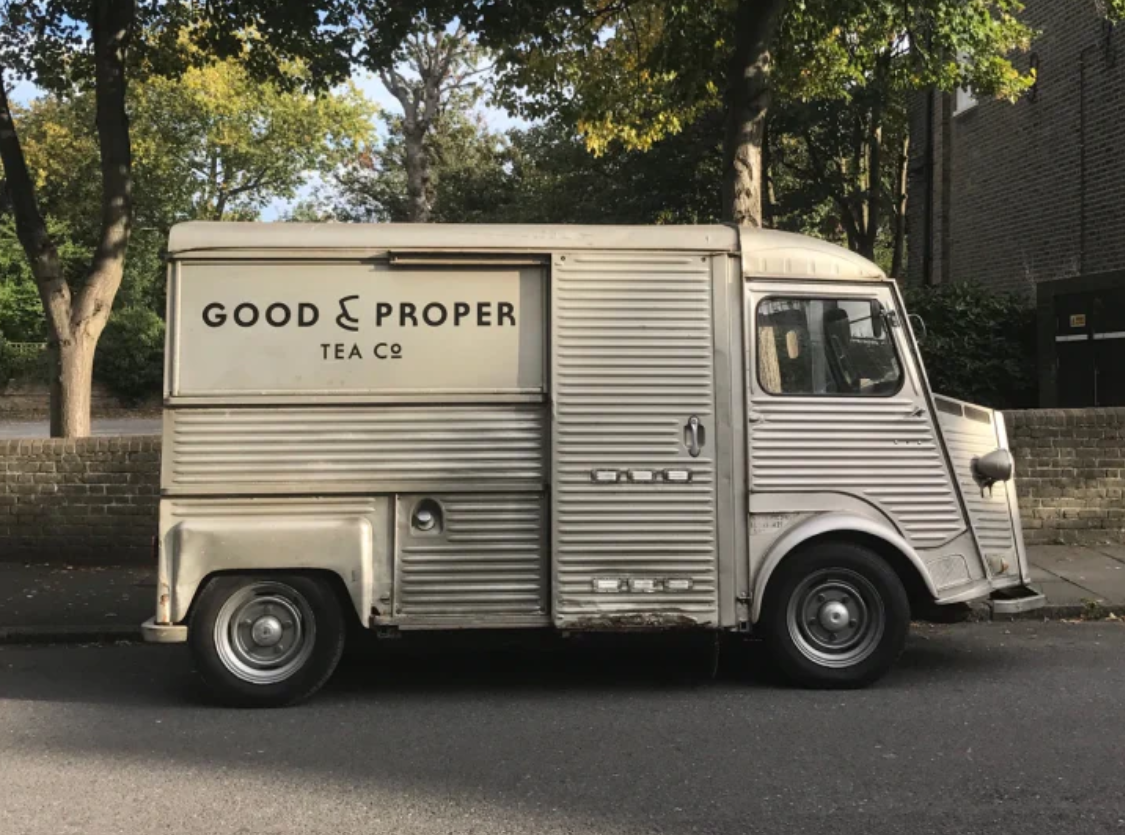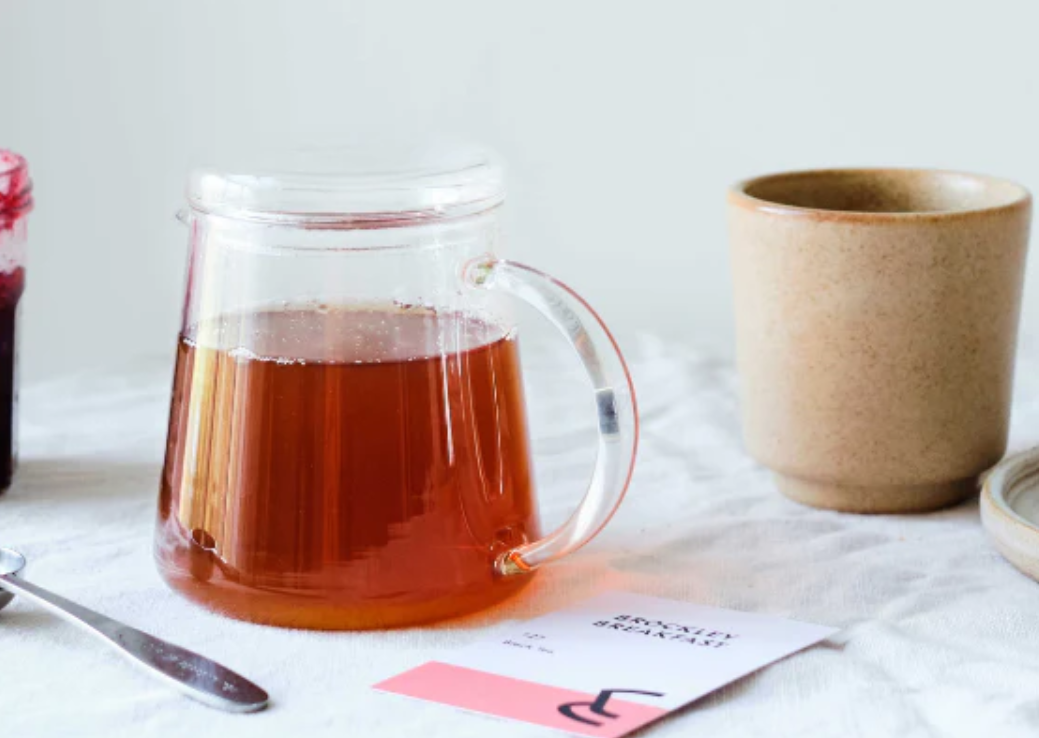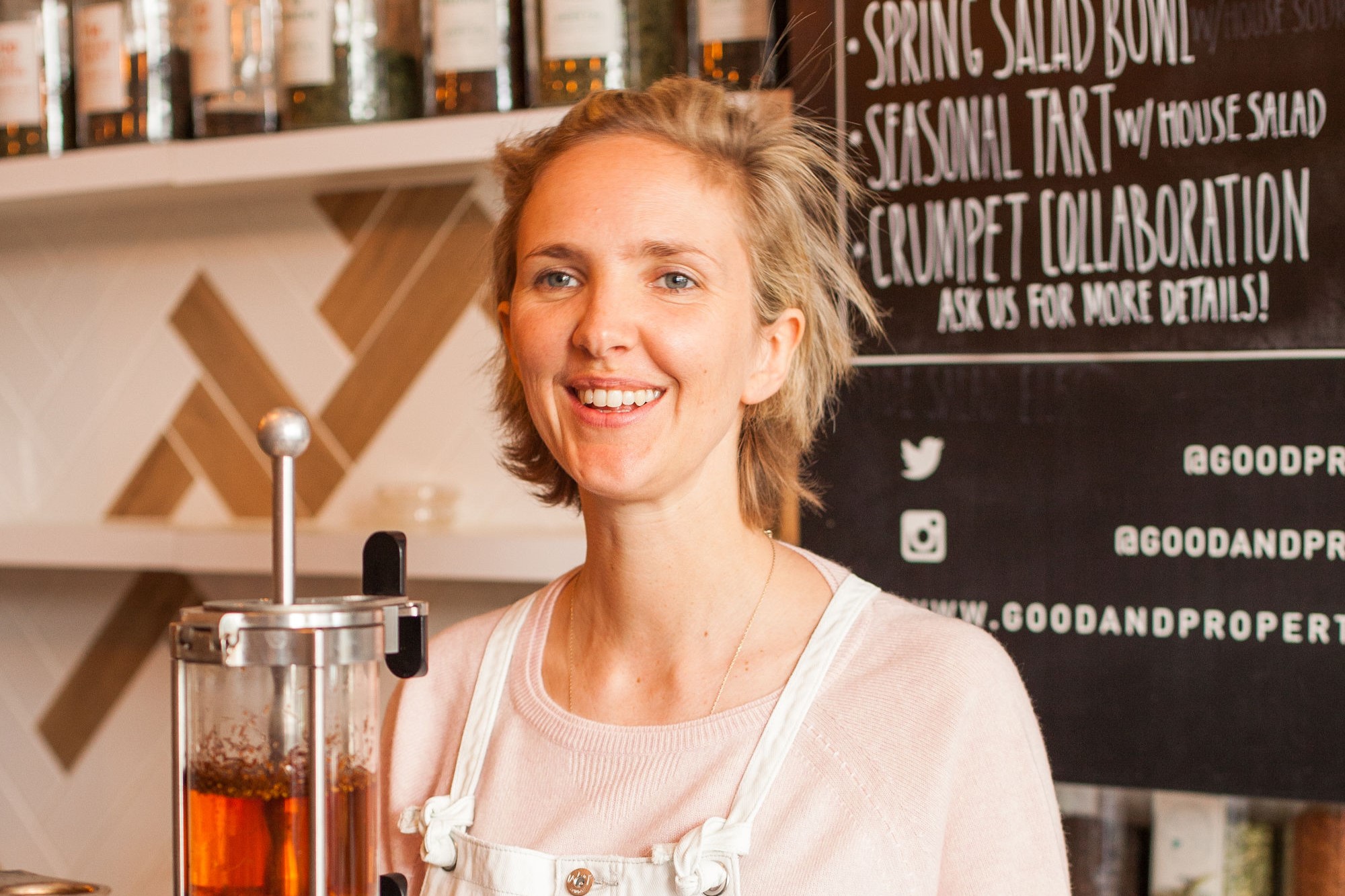#IWD2023 series: Interview with Emilie Holmes, Founder of Good & Proper Tea
From global advertising to sustainably-sourced specialty tea, this is Emilie’s story!
This International Women’s Day, we’re giving the floor to some of the cool female founders that we know, to share insights on their missions, perspectives on future trends for their purpose-led industries, and what they’ve got planned for the next year.
To start off this mini series, we’re speaking with Emilie Holmes, the Founder of Good & Proper Tea. Noticing the lack of quality and responsibly sourced tea in London, Emilie converted a 1974 Citroën-H van into a mobile tea bar, funding the first step of this venture via the crowdfunding platform Kickstarter. With the support of 372 backers (whose names are still displayed proudly on the back window of the van, named ‘Watson’), the first cup of tea was brewed on the 3rd December 2012. Now an online specialty tea shop, with an expanding number of partners, Emilie is running Good & Proper with a sustainable and planet-friendly vision.
Could you tell us a bit about your professional background and your route into creating Good & Proper?
I began my career in Advertising, at Ogilvy & Mather, working primarily on the global Dove brand. It was a great learning experience as I was involved in everything that underpinned a brand - the customer insights, the psychology, the behavioural science behind a brand, all the way through to the design output and the rigorous process of creating meaningful advertising that delivered on the clients brief. Now I am the client (!), I always try to keep all of this top of mind - and know how important it is to protect the integrity of the brand as we grow. I was also able to work with some fantastically talented people, who I of course hit up when it came to creating a brand for Good & Proper ; )
My idea for a tea business actually came before joining the world of Advertising - I had long been frustrated by the quality and variety of the tea available so was doodling ideas long before Ogilvy but I was keen to get a job before going out on my own. I wanted to learn as much as possible before taking that step, so it was a few years before I plucked up the courage to finally do it!

What's your 1-liner mission with Good and Proper?
Good & Proper Tea is on a mission to show the world how good tea can be, when it's done properly. Our purpose alongside that is to raise the profile of specialty tea and in doing so help build a thriving and sustainable tea industry for the future.
What were the biggest challenges when beginning the organisation?
Oof, too many! Everything is a challenge at the start, but it's also so exciting that they feel less painful at the time. I think a lack of resources, both people and funds, to do all of the things you want to do is probably the biggest challenge at the start - in fact it still is in some ways! I was so ambitious with my plans and so excited by the opportunity that I was often frustrated that everything took so long, cost so much and I felt like I needed more hands on deck...permanently! But it's also that that makes you creative in the way you approach things in the early days as you simply don't have the traditional means of doing things, like using agencies, hiring big teams or enlisting consultants - you just innovate and find engaging ways to get the brand out there and absorb every possible learning as you go...

From your perspective, what needs to happen to make the tea production process more sustainable?
There are lots of things that are true across all agricultural products, such as adopting sustainable farming methods, more efficient energy use / production, water conservation, biodiversity etc...but before any of that can be fixed we need to ensure that the producers are adequately supported in order for them to be able to tackle any of that. That means paying proper prices for our tea, which is a big issue given that still now supermarket shelves are crammed with low quality, low price, large quantity pack formats that people are used to buying. We now have a big job to do to re-educate the consumer that paying £1 for 280 tea bags just isn't right when you think about the people and the process that has gone into each of those.
So on the one side we need to help with how the customer thinks about tea to encourage a greater focus on sustainably sourced, quality tea, and on the other we need to try to push more of that value up the supply chain, back to origin, in order to help the producers themselves overcome the challenges they face, whether they be social or environmental.
Can you walk us through any exciting plans you have coming up for 2023 and beyond?
We have just celebrated our 10th birthday so have plenty of plans for the coming years as we move into our 2nd decade of tea!
Top of the agenda is all things sustainability; we are in the process of becoming B Corp which is a huge project, but one that we are super excited to be working on. We're also working on our Net Zero plans and putting more structure around that which is also something we're proud to be focusing on.
FInally, there is a lot of NPD coming down the line, from a 'wellness' range, which will apply our quality focus to the world of botanical blends, to beautiful gifting formats - we've got a lot to do!

Finally, what 'green' or social impact trends/practices for tea do you think will emerge in the next 2-5 years?
I think and hope that the bar will continue to be raised when it comes to quality, and as I've said that's important because, if done properly, that should help both challenge existing expectations of what we should be paying for tea, as well as push more value up the supply chain to producing communities.
I think health and wellness will continue to be important and give tea a real advantage as it's such a fantastically healthful product (100% natural, calorie-free, plant-based, vegan...the list goes on - it's the ultimate clean label!).
Finally I hope that more and more people will opt for loose leaf. We sell both loose leaf and bags of course, but the former not only brews a far superior cup of tea, it is also so much better for the environment as there's no bag, no tag, no further handling - just the tea leaves, pure and simple. Plus it costs less per cup and, just like making proper coffee, is a wonderful ritual to introduce into your everyday routine.
We hope that this interview inspired and informed you, whether it comes to thinking about sustainable products, entrepreneurship, or just how we drink tea! Check out our other International Women’s Day interviews here.